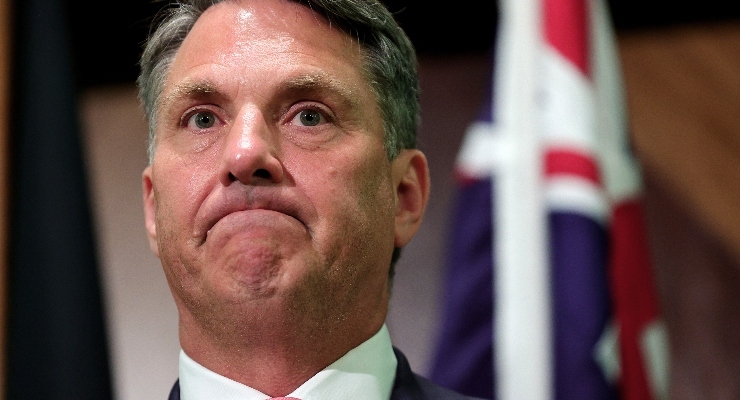
It was all too easy to miss last week, amid the noise of an already crowded parliamentary sitting and the unprecedented censure of a former prime minister with his uncut, quintessential denials of accountability.
But two years on since the redacted version of the Brereton report was released, and merely six months into the 47th Parliament, it’s become tolerably clear the Albanese government has resolved to jettison Scott Morrison’s slow and politicised response to parts of the war crimes report.
In recent weeks, there have been confirmed reports the defence force has sent — with the unqualified support of Defence Minister Richard Marles — show cause notices to several former and serving special forces commanders as to why they should retain individual honours associated with their deployments in Afghanistan.
The possibility of such a review was, of course, conceived in one of 143 recommendations in the Brereton report, but was memorably shelved last year at the urging of the Morrison government, along with any move to strip special forces troops of their meritorious unit citation.
“This is how we deal with these issues in Australia,” Morrison said of his decision to override defence chief Angus Campbell at the time, “according to the rule of law, the presumption of innocence until proven guilty”.
Yet traces of a shift in approach can also be found in statements by Marles since July, and reaffirmed as recently as last week, regarding the government’s commitment to compensating the families of those killed by Australian soldiers in possible violation of the laws of war.
This initiative, too, was a central recommendation of the four-year Brereton inquiry, but one which similarly languished and fell to the wayside under the Morrison government.
Distilled, the temptation here is to see these developments as emblematic of what commonly manifests as a difference in policy emphasis when a new government takes the reins. But it’s a view that is, at best, partial. Much, after all, has been made of the Albanese government’s wider ambition to right the consequences of several years of foreign policy blunders bookended by Coalition incompetence, and these movements appear to fit the mould.
In this connection, there is no denying that Morrison’s failure to heed the warnings of senior defence officials, regarding the risk of perceived inaction on the Brereton inquiry, has been costly.
For one, the near-indelible impression that allegations of war crimes committed by Australian soldiers enjoy a level of impunity or indifference to censure has severely blunted the government’s criticism of human rights abuses elsewhere. Nowhere has this reality been more profoundly laid bare than with respect to China, which has routinely returned the charge with interest.
Opposition defence spokesman Andrew Hastie — a former SAS captain who served in Afghanistan — recently echoed this view, citing the inevitable demise of moral authority that accompanies national failures to reckon with dark chapters of the past.
“The Brereton inquiry, as it is known, has been very tough, but it has been necessary,” he told a London audience in July. “For if we cannot hold ourselves to account for unlawful battlefield conduct in Afghanistan, by what standard do we condemn Russian acts of barbarity in Ukraine?”
On a granular level, then, the narrative underpinning the Albanese government’s willingness to tread where the former government resisted is a simple, if not self-serving, one: failure to act on the report’s recommendations harms Australia’s moral integrity, the absence of which diminishes its diplomatic weight on the global stage and, in turn, obstructs its national interest.
Lost in any commentary so far, however, is consideration of the extent to which this approach could — in time — redefine the limits of Australia’s identity.
In 2018, former defence minister Brendan Nelson said: “I question whether the national interest is [being served] in trying to tear down our heroes.” The comment was made in response to allegations about and denied by Victorian Cross recipient Ben Roberts-Smith, but nonetheless reflected the unbroken reverence with which the armed services have long been held.
And it’s precisely the seeming death of this idea — that the armed services are beyond reproach — and the rise of collective moral accountability that could, if it comes to pass, license a radical break in Australia’s identity.
To this end, it bears emphasising that a number of the commanders issued show cause notices over the past month were found in the Brereton report not to bear individual criminal liability for what allegedly occurred under their command, but rather collective moral responsibility.
Still, the government’s gambit is not without risk. As Steve Pilmore, vice-president of the Australian Commando Association, told Crikey, in the absence of any findings of guilt it appears to run contrary to due process. “The timing is wrong. No one has been found guilty of any of the things in the Brereton report and therefore to seek punishment by way of handing back medals appears to be premature,” he said.
“We live in a country of due process and where we have a set of laws and soldiers defend those laws, so they should be able to expect that those laws protect their freedoms in the same way as anyone else.”
The difficulty with this position, however, is that it wrongly conflates what is ultimately an administrative action — a correction of the record — with punishment.
The reverse position, for what it’s worth, also comes with costs — not least a seeming embrace of the idea that war knows no limits; a notion that does irreparable damage to both the Australian Defence Force and Australia’s standing in the world.
As the Brereton report concluded: “The consequences of not addressing such allegations as and when they eventually arise are measured in the decades.”
It’s this that is front of mind for the government.








Afghanistan and Iraq, were both illegal, pointless and cruel. And we are reminded of President Eisenhowers words in 1961, regarding the need to control the US military industrial complex, which we failed to do. It is time to end our puppetlike relationship with the US (which is itself close to falling into anarchy) and tread our own path. We are in no danger from China, unless the US decides to go down fighting, in which case they will takes us with them.
From unsinkable aircraft carrier to smoking ashtray, in short order.
And as geography has it, we will be the first wave, on the front row, while they watch from afar and ponder their next move.
This needs to be the first step in untangling ourselves from the Military Industrial Government and Finance Complex of the USA….
It’s rarely reported that Ike’s farewell address (written with his brother) originally called it the ‘bureaucratic MIC‘ but that was removed prior to Jan 17nd, 1961.
Can’t imagine why.
This is the common obfuscation used to demand no action on anything, sometimes including making no relevant findings in an inquiry, until a court of law has pronounced guilt. It is demanding a standard that applies only to pronouncing someone guilty of a crime and then punishing them for it should be applied universally, which is wholly inappropriate and makes it impossible to hold anyone to account for anything except through the criminal law.
Removing a medal is no more than saying the award of the medal was not appropriate given the light of new information. It is an administrative measure to be taken on administrative grounds. It is not a finding of criminal guilt and it not a punishment for a crime. Just as requiring a government minister or whoever to step down when there are sufficient grounds for making that demand is not a finding of criminal guilt and it not a punishment for a crime.
Career soldiers have medals as part of their actual identity. Medals are their history, their self-regard, their pride and dignity in a murky industry. To remove a medal is a big punishment. Soldiers are very much realists while at war, completely removed from the civilian idea of ‘our brave lads, keeping us safe from the enemy’ BS. They do what they are told to do by the politicians (who also have no clue what they’re actually asking) while trying to keep each other alive. It’s basically a lunatic assignment, but I guarantee that Australian soldiers fight cleaner than any other army on the planet, especially these days with everything filmed, photographed and analysed. The tragedy, and crime, OBVIOUSLY, is being sent to fight people with whom we have no fight. Did we learn anything from Vietnam? Did we learn anything from Iraq? Did we learn anything from Afghanistan? We should have learned that IT’S OK TO STAY AWAY!!! But we didn’t.
Taking medals away is the act of a dog. Or a politician, or a journalist.
Soldiers treat the Geneva Conventions as welcome firm guidelines, to be followed religiously wherever possible. Soldiers are further constrained, very much so, by our society’s normal rules and feelings of morality. Isolated incidents when these bounds are over-stepped are caused by unexpected issues such as fear of imminent death, impossible to analyse truly in a courtroom or anywhere else. If you weren’t there you do not know.
PTSD kills more soldiers than the enemy. To add to that score, take away their medals.
Sorry to go on about it Rat, it’s one of my buttons. Imagine if I wasn’t on meds for it.
Fine, agreed; but it still there is no reason to apply the standards of a criminal court to a matter, such as whether or not to award a medal, that is not concerned with determining guilt for a crime.
Standards seem to depend on the war – probably through the level of threat experienced by the home population and therefore their willingness to accept drastic measures. Wars of choice that we have been engaged in do not fit that frame at all.
An example of standards for the context of the war is the fighting in PNG in WW2. Neither side was much interested in taking prisoners, and nor were the locals.
See my comment above drastic.
Accepting a medal when you know you witnessed or participated in possible war crimes is the dog act. Removing it is righting a wrong. People seem to have missed that the evidence is from other members of ADF… apparently we shouldn’t listen to them, only the ones that are accused, by their peers, of wrong doing
maybe the dispensation of more medals is the antidote for the PTSD..
Yes the conflation of administrative action and criminal convictions is really absurd. the standards of proof are different.
There was a vox pop of Americans at the time of the Abu Ghraib photos. Most defended “our troops” etc, but one old guy in a bar said, “Seeing those photos made me feel ashamed to be an American.” I felt he was the only one with any honour.
indeed… that was inexcusable and it’s absurd that juniors were thrown under bus. no way they were instructed to act the way they did.
While ever the government continues the prosecution of David McBride, it can be assured that they aren’t serious about the actual criminals. Worrying about who gets to keep their medals is simply a red herring.